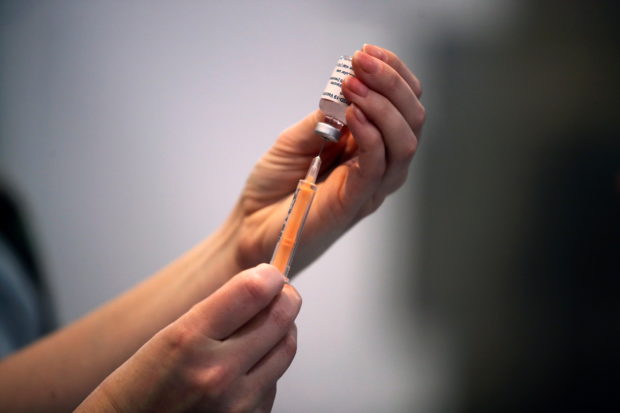
FILE PHOTO: A healthcare worker prepares a dose of the coronavirus disease (COVID-19) vaccine at a vaccination center inside the Blackburn Cathedral, in Blackburn, Britain, January 19, 2021. REUTERS/Molly Darlington
LONDON — A UK study into using different COVID-19 vaccines in two-dose inoculations is being expanded to include shots made by Moderna and Novavax, researchers said Wednesday.
The trial, known as the Com-Cov study, was first launched in February to look at whether giving the first dose of one type of COVID-19 shot and the second dose of another elicits an immune response that is as good as using two doses of the same vaccine.
The idea, said Matthew Snape, the Oxford University professor leading the trial, “is to explore whether the multiple COVID-19 vaccines that are available can be used more flexibly.”
Britain and many other countries in Europe are currently using AstraZeneca’s and Pfizer’s COVID-19 vaccines in nationwide immunization campaigns against the coronavirus pandemic.
But reports of very rare blood clots have prompted some governments – including France and Germany – to say the AstraZeneca shot should only be given to certain age groups, or that people who have had a first dose of AstraZeneca’s vaccine should switch to a different one for their second dose.
In a briefing about the expansion of the study to include Moderna’s and Novavax’s COVID-19 vaccines, Snape, an associate professor in pediatrics and vaccinology at Oxford, said it will seek to recruit adults aged over 50 who have received their first, or “prime” vaccination in the past 8-12 weeks.
These volunteers, who will have received either the AstraZeneca or Pfizer vaccine, will be randomly allocated to get either the same vaccine or the Moderna or Novavax vaccine, for a second dose.
The six new arms of the trial will each involve 175 people, adding a further 1,050 recruits in total, Snape said.
“If we can show that these mixed schedules generate an immune response that is as good as the standard schedules, and without a significant increase in the vaccine reactions, this will potentially allow more people to complete their COVID-19 immunization course more rapidly,” Snape said.
“This would also create resilience within the system in the event of a shortfall in the availability of any of the vaccines.”
Results from the original mixing trial, using AstraZeneca and Pfizer shots only, are expected as early as April or May, while results of the second phase should come in July.